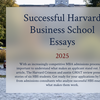Nearly one quarter of the student body received a supposedly-confidential e-mail message yesterday, which just happened to list the names of 1,300 fellow work study recipients.
Intending to alert students to jobs in public service, the Federal Work Study Office accidentally failed to "suppress" the e-mail addresses of half of the recipients.
The result was an easily accessible master list of students eligible for work study--a breach of privacy in many students' eyes.
"Although students shouldn't be ashamed to receive financial aid, it is sensitive and the office should have been more discreet," said Manisha S. Shetty '00. "Just scrolling through the list is violating confidentiality."
In a second e-mail to students yesterday afternoon, Director of Student Employment Martha H. Homer apologized for the inconvenience of a long message, but did not acknowledge a confidentiality breach.
"We had intended to suppress the recipients' list and not have you scroll through several hundred names," Homer wrote to students.
Later in the day, Homer told The Crimson that "we did not want to be the first to bring up the breach of confidence if it hadn't been an issue."
The lack of privacy regarding their financial aid status did not seem to bother most students affected.
"It does not make me uncomfortable," said Sarah E. Beasley '99-'00 . "I don't care if people know I am on financial aid. I'm not ashamed of it."
Francisca M. Geyer '01 agreed, adding, "I can't see that this was done intentionally, although I could see how people would be upset." Homer said she believes that students should find comfort in the length of the list.
"It was a breach of confidence, but the students whose confidence was breached have a lot of company," said Homer, who added that her intent was to help students learn about ways to make money.
"It is hard for a legitimately good program to get students' attention at this time of year," Homer said. "The spirit was right, but the execution was not."
The program has caught the attention of hundreds of students, but not necessarily in the ways originally intended.
"First of all, I didn't want to have to scroll through all those names to read the e-mail," said Daniel A. Ponce '99-'00. "A 44K e-mail takes up a lot of space, and I am now less willing to keep [the message] in my inbox for future reference."
Homer said the error was an isolated incident.
"This is an example of the disadvantages of massive e-mail messages," Homer said. "We have taken every step to avoid this. It has not happened before and will not happen again."
Read more in News
Panel: Latinos Will Form Swing VoteRecommended Articles
-
Expos Defeat Valenzuela 3-0; New York Routs OaklandA full house of 53,463 jammed into Dodger Stadium last night to see their darling rookie sensation Fernando Valenzuela, pitch
-
Red Sox Falter in Detroit, 5-4; Slip Three Games Out of FirstFor at least a few more days--and maybe for longer than that--the champagne bottles will have to remain corked. On
-
Baseball Splits Four on Road To Begin Ivy League SeasonForgive Harvard baseball coach Joe Walsh if he seemed a little anxious in the final moments of the Crimson's 3-2
-
E-Mail Reveals Names of 130 Students on AidA financial aid officer unintentionally revealed the identities of over 130 students on financial aid Tuesday when a confidential message
-
Freshmen Receive Spam E-MailsOver 30 unsolicited e-mails have spammed the inboxes of 1,105 freshmen since Monday afternoon, when Harvard Yard Operations (Yard Ops)
-
 Softball Splits Twinbill with League Power Cornell
Softball Splits Twinbill with League Power Cornell













